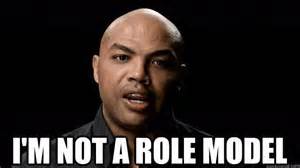Should Athletes Really Be Role Models?
While many still ponder the question–the likes of Charles Barkley come to mind–the question has already been definitively answered. Between cut scenes of him dunking a basketball on a practice court, he earnestly tells the camera:
I am not a role model. I am not paid to be a role model. I am paid to wreak havoc on the basketball court. Parents should be role models. Just because I dunk a basketball doesn’t mean I should raise your kids.
This was a Nike ad during the heyday of the “Just do it” campaign. When the words, “Just do it” appeared at the end of the commercial, it is not obvious if they are referring to playing basketball, or raising your own kids in a responsible manner. What they most definitely exclude is the idea of using Barkley, or any other athlete as a role model for how you, or anyone else, should live their lives.
There are all kinds of reasons why Barkley’s words should be heeded. Here are a few:
Athletes Make Poor Life Choices
According to Axis Recovery:
Because of these factors (among a number of others), the Partnership for Drug-Free Kids states that sportspeople are “more prone than the general population to substance abuse.”
The three factors referenced in the above quote are:
- An addiction to performance-enhancing substances
- An addiction to stimulants to alleviate depression
- An addiction to prescription painkillers
There are understandable reasons why professional athletes make self-destructive life choices. In no way is this intended to be a judgmental observation. But it seems like the last type of person you want to set up as role models for kids is the kind with ample reason to turn to drugs and alcohol as a necessary evil for getting through the day.
Beyond substance abuse, there are other habits one might not be comfortable encouraging such as gambling and sexually irresponsible behavior. Many of the behaviors of professional athletes can be attributed to the fact that they are all young. Professional athletes tend to retire in their early to mid-thirties, much younger depending on the sport. They often went from rags to riches overnight, without any prior sense of responsibility. Even under the best of circumstances, they are going to make a lot of bad decisions that others simply cannot afford to make. This is the recipe for an unlikely role model.
We Should Want Our Kids to Dream Bigger
Charles Barkley can dunk a basketball. Not only does that not qualify him to raise your kids, it doesn’t qualify him to inspire your kids. That is because 10” of elevation is not a high enough target for your kids. They should aim higher, much higher.
In high-school and college, sports can be a great motivator for kids to aim high, work hard, and reach their goals. Professional athletics is a completely different animal. There, athletics is the goal. Chasing the ball can make you a lot of money if you are one of the few who get to do it for a brief living. But it does nothing to cure cancer, or produce flying cars.
If a doctor is a role model, it is fine for kids to want to follow in those footsteps. If an athlete is a role model, the best you can hope is that your kids will become proficient at putting a ball in a hoop, or moving it across a field, or hitting it with a bat. We should want our kids to want more for themselves, so much more.
Athletes Don’t Want to be Role Models
Perhaps the best reason not to make role models out of athletes is that they don’t want to be role models. Would you hire a babysitter who didn’t want to be a babysitter? Would you consult a doctor who didn’t want to help you? Why would you want to have a role model who didn’t want to be a role model?
I find myself agreeing with Barkley. If anyone should be a role model, it should be the parents of a child. Beyond that, it is not clear that anyone should be a role model, especially someone who clearly does not want to be.
Sources:
http://www.axisresidentialtreatment.com/drug-abuse/addiction-pro-sports/

The computer education have many disadvantages. The eyes problems are created by excess use of computer. When you goes to study on computer and work to long time, the harmful rays from monitor screen can affect your eyes.
Do you mind if I quote a few of your posts as long as I provide
credit and sources back to your webpage? My blog site is in the exact same niche as yours and my users would truly benefit from a lot of the information you provide here.
Please let me know if this alright with you.
Regards!